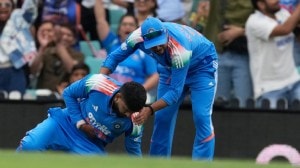CJI, Speaker sitting, Kalam stands up for the Executive
President A P J Abdul Kalam has touched off what could turn into a controversial debate on the delicate balance of powers between the judici...

President A P J Abdul Kalam has touched off what could turn into a controversial debate on the delicate balance of powers between the judiciary, the legislature and the executive. It was the turn of the executive today to raise the issue of its independence, or what appeared to be the lack of it. And it came from none other than Kalam himself.
‘‘All along it has been said that the executive is the third pillar of democracy which is independent of the other two. I, however, have a different view. Please do bear with me if I say that the independence that is expected of this pillar is only in theory and mostly eroded in actual practice,’’ Kalam told an august gathering here to mark National Legal Literacy Day.
Call it coincidence but those present on the dais included Chief Justice of India Justice Y K Sabharwal and Lok Sabha Speaker Somnath Chatterjee. Justice Sabharwal headed the five-judge Constitution Bench which questioned the legality of the Presidential proclamation dissolving the Bihar Assembly. The Supreme Court, in an interim order last month, called it unconstitutional.
Kalam couldn’t have been clearer: “How can we expect an executive to function independently when each of its action is questioned and its functioning is made regularly actionable by, and accountable to the independent powers enjoyed by the legislature and the judiciary. Large number of regulations exist to constantly keep the actions of the executive under the watchful glare of the legislature and the judiciary and that unquestionably takes away the much bandied about independence of the executive.’’
Kalam then reminded all that ‘‘controls and provisions for interpretation and answerability are also applicable to the legislature and judiciary, but in their cases a built-in system within would be available for discharging those functions.’’ Before the President’s speech, Rajya Sabha MP Arun Shourie set the ground for the debate, saying legislators at times used ‘‘strong words’’ against judges.
But the Lok Sabha Speaker, caught in a controversy over his criticism of the Supreme Court’s decision in the Jharkhand Assembly dispute, was quick to rebut.‘‘I do not agree with Shourie’s suggestion that the legislature is using strong words against judiciary.’’ He added that the language used was ‘‘civilized’’.
Kalam then proceeded to read from his prepared speech.
‘‘What is required is a conscious realization of unseen boundaries that cannot be traversed without causing embarrassment and even injustice to the democratic system and the rights of its citizens. Realisation by each one that the other two are equally vital and significant is essential for a healthy democratic system.’’
‘‘Stand-off between these systems can only be at the cost of the system itself and is sure to put the system in peril,’’ he warned. Kalam’s final advice was a polite but stern message to Constitutional functionaries. ‘‘It is not practicable nor advisable to specially lay down these boundaries, to make them inviolable, but each of these three pillars is enlightened enough to circumscribe its area of operation to consciously avoid intrusion into another’s territory even where the dividing line is slim, even vague.’’



- 01
- 02
- 03
- 04
- 05




























